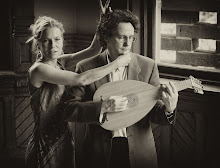
John Dowland obtained his Bachelor of Music from the college of Christ Church in 1588, so there was plenty to choose from. Since Robert Burton wrote his Anatomy of Melancholy while he was student at Christ Church (that's equivalent to fellows at most colleges there) we sang Flow my teares of course. After quoting Burton's opinion that 'the poets did well to feign all shepherds lovers', and melancholy ones at that, since they are idle and solitary while grazing their flock all day, we sang A shepheard in a shade. The pastoral theme was augmented by an anonymous setting of Goe my flock the Ninth Song from Sidney's Astrophel and Stella. Sidney was also a Christ Church grad, and Astrophel is the original English manifestation of the melancholy shepherd-lover.
But we started our set with an arrangement for lute and voice of Benedicam Domino, a devotional song for four voices by Robert Johnson. This Robert Johnson was a Scot who appears to have come to England because he was an 'early adopter' of protestantism. The version we performed is from the back of a manuscript which is a Catalogue of the Bishops of England by Francis Godwin who was a student at Christ Church as well. The last section of the
song exhorts us to pray for our queen, but which queen is not clear, since Johnson was dead before Elizabeth came to the throne. It seems unlikely that Johnson would be setting a text that was pro-Mary, Mary Queen of Scots or Mary Queen of Heaven. So maybe the text was adjusted by the scribe who wrote our version in Elizabeth's reign as was not unheard of. A motet at Christ Church dedicated to Cardinal Wolsey, the college's founder, was later adjusted to ask God to 'preserve our Queen Elizabeth'. Below is the singing part of the song from a microfilm of the manuscript in the British Library. The singing part is at 90 degrees from the lute tablature part, so the singer would be unlikely to self-accompany; the lute player sat on one side of the table and the singer on another.


